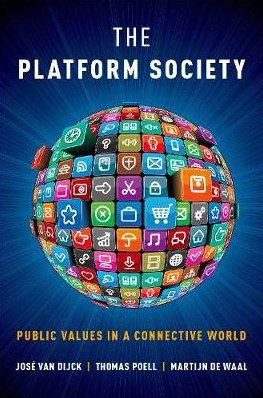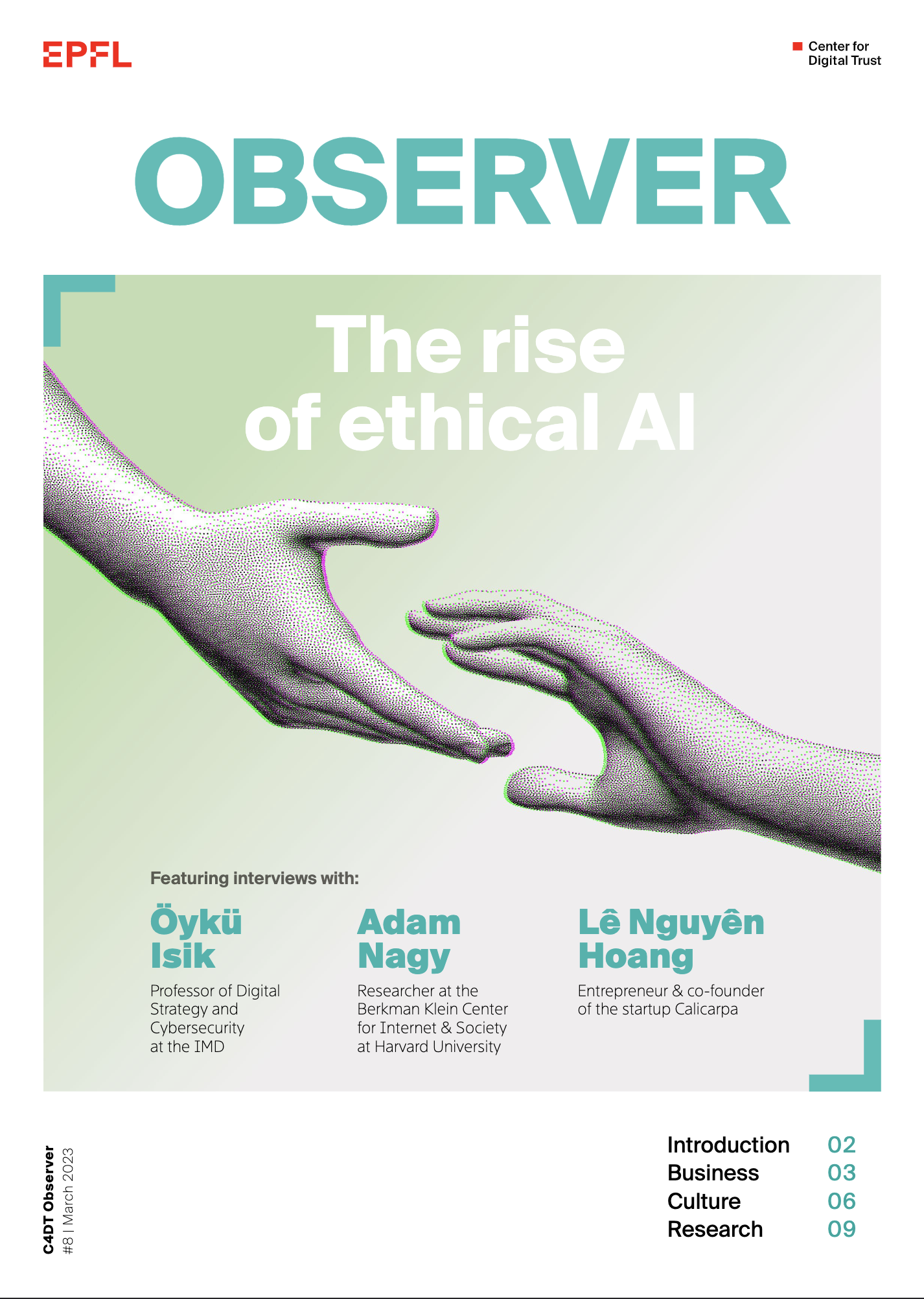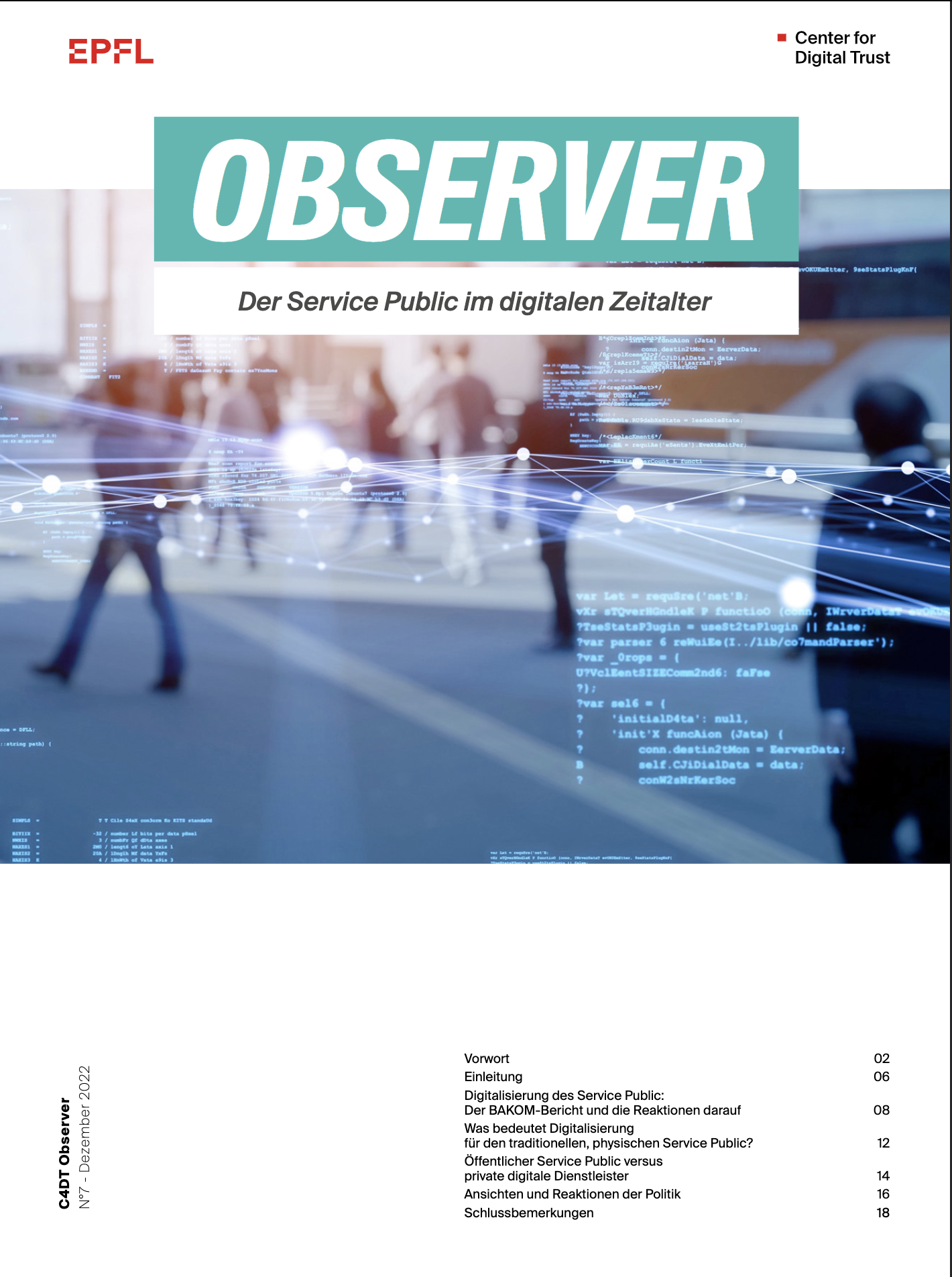
Van Dijck, J., Poell, T. and M. de Waal (2018). The Platform Society. Public Values in a Connective World. Oxford: Oxford University Press, 226 pages. By Matthias Finger This book is already five years old and probably older if one considers the time of writing, an eternity when it comes to rapidly evolving digitalization. Yet, (…)

Join us on July 12 for an insightful event co-hosted by C4DT, CIS and IMI, featuring a talk by visiting professor Anderson Rocha from the University of Campinas in Brazil on “AI-driven synthetic realities and trust: implications for the media and our society”. This thought-provoking talk, followed by a panel discussion with EPFL professor Touradj Ebrahimi, affiliated with C4DT, and moderated by researcher and journalist Gilles Labarthe, will shed light on the crucial role of trust in navigating the intersection of AI and synthetic realities, making it a must-attend event for anyone interested in the future of technology and its impact on society and the media.

This blog post was written by our C4DT Digital Trust Policy Fellow, Leonila Guglya. The opinions expressed in this publication are those of the author. They do not purport to reflect the opinions or views of C4DT or EPFL. On 18 June 2023, the citizens of the canton of Geneva in Switzerland voted for the (…)

Congratulations to C4DT associated professor Touradj Ebrahimi for being elected as a Fellow of the Asia-Pacific Artificial
Intelligence Association thanks to his pioneering activities at the intersection between #AI and Trust.
AAIA gathers top scientists in different disciplines that can be combined with AI, AI related institutions, and entrepreneurs that have AI applications to drive innovation, development and application of AI.
Prof. Ebrahimi is an Adjunct Professor and is the Head of the Multimedia Signal Processing Group at EPFL. He is also the founder of RayShaper SA, a high-tech start-up company in the field of AI-powered computational vision.

[bilan.ch] [langue : Français] Assureurs et employeurs peuvent obtenir des informations sur les métadonnées. Olivier Crochat, directeur exécutif du Center for Digital Trust de l’EPFL, met en garde les utilisateurs de ces outils. // Article protégé par un paywall.

[rts.ch] La vague ChatGPT accélère la course à l’intelligence artificielle et à ses innovations, mais renforce les risques de désinformation à grande échelle. Invitée : Sabine Süsstrunk, professeure Ecole Polytechnique fédérale de Lausanne et affiliée au C4DT.

With its Artificial Intelligence Act, the EU wants to ensure that Europeans can trust in what AI has to offer. The EU AI Act will introduce an approach of evaluating risks of AI systems on the principles of ethical AI. Its impact will be felt widely across different industries as the law creates new regulatory (…)

[rts.ch] La RTS s’intéresse aux progrès de l’intelligence artificielle, et interview le Prof. Rachid Guerraoui, affilié au C4DT, en direct de l’EPFL.

Data Science, including Artificial Intelligence and Machine Learning, has already sparked a lot of innovation and insights. But how can it create value for your domain of expertise and impact your bottom line?
SDSC-CONNECT is a series of conferences organized by the Swiss Data Science Center. We address challenges and applications in the fields of data science, machine learning and artificial intelligence, in a broad range of areas.
Major digestive surgery is associated with a high comorbidity (i.e. high risk of complications after surgery). Anticipating Postoperative complications (POC) may help and guide clinicians in the postoperative management of surgical patients. Unfortunately, the available tools in clinical practice are of restraint value due to their limited accuracy. Recently, artificial intelligence (AI) has shown a meteoric rise in medicine, showing numerous clinical applications but its role to predict POC remains unknown. We aim to use AI to develop new models allowing to improve the prediction of POC in a dataset of >2000 patients undergoing major digestive surgery.
Liver cancer is the second deadliest malignancy. It essentially accounts hepatocellular carcinoma (HCC). Surgery with liver resection is the main curative option but unfortunately, it is only recommended in patients with early HCC. Prognosis of HCC is particularly challenging and results from numerous attempts using various strategies remain relatively poor.Artificial intelligence (AI) has demonstrated unmatched value to decipher complex traits and mechanisms. This multicentric effort will include 8 Academic centers from the United States, Europe and Asia, allowing to generate a large-scale dataset of patients undergoing liver resection for HCC. We aim to investigate the input of AI to improve prognostication of these patients.
Liver cancer ranks third in terms of cancer-related mortality. Hepatocellular carcinoma (HCC) accounts for 90% of primary liver cancers. Tremendous efforts have been pursued to establish HCC prognostic, including clinical, radiological, pathological and even molecular readouts. Regardless of the strategy, the performance of these tools remains modest. Recent data using artificial intelligence (AI) on HCC histology (microscopy) have revealed promising results. We aim to submit pictures of liver cancers specimen to AI models to generate algorithms allowing to establish prognosis in a large-scale study including centers from North America, Europe and Asia.
![[FR] Intelligence artificielle : le grand remplacement ?](https://c4dt.epfl.ch/wp-content/uploads/2023/02/jaggi.png)
Le service d’intelligence artificielle ChatGPT fascine la planète. Et pour cause : posez-lui la question que vous voulez et la machine vous répondra suffisamment bien pour passer un examen universitaire à votre place, rédiger vos mails ou même, c’est pour bientôt, assurer votre défense devant un tribunal. Quel bouleversement pour l’école et l’apprentissage ? L’intelligence artificielle peut-elle (…)

IMI has been invited to host a series of presentations during the upcoming annual conference of SGKM (the Swiss Association of Communication and Media Research). For this, they are collaborating with C4DT and have chosen the theme of automatic content generation (and detection) and (dis)information dissemination in the digital age, under the working title “AI, synthetic media and society”. The organizers are particularly interested in IMI’s interdisciplinary approach and the practical aspect of their projects. The goal is to present the current state of research in computer science, to show that this theme is a breeding ground for interdisciplinary research (ethics, law, social sciences, etc.) and to inspire new interdisciplinary collaborations.

Gain in-depth understanding of the digital ecosystem, cybersecurity and digital trust, and interface with internal and external ICT stakeholders.
![[FR] Prisée par les mineurs, l’application TikTok n’est pas sans danger](https://c4dt.epfl.ch/wp-content/uploads/2023/01/index.png)
L’application TikTok compte près de 440’000 adeptes en Suisse, dont un tiers de mineurs. Dans plusieurs pays, les autorités tentent de prémunir les enfants contre les dangers du réseau social, mais la tâche s’avère compliquée.
Implementing and deploying highly secure cryptographic protocols is difficult. This informal and educational workshop will address the issues uncovered during the public intrusion test of the Swiss Post/Scytl e-voting solution. We will explain, for a non-technical audiance, what were the problems found and why do they matter. We will also draw lessons on how to make cryptographic implementations more secure and auditable.
The outbreak of COVID-19 has not only caused a global pandemic, but it has also provoked the spread of what seems to be an unstoppable #Infodemic, an epidemicspread of informationonline. Cyberattacks are on the rise, exploiting the social distancing measure that has forced millions of people to stay in theirhomes, working and studying remotely, or surfing online to fill their time away from work. The frustration and anxiety of these times has made people more vulnerable targets. Beyond its obvious impact, dis-/misinformation also offers a critical vector for cyberattacks.
For more information, please click below…
June 15th, 09:30-17:45, & June 16th, 2020, 09:00-15:15 @ EPFL’s Swiss Tech Convention Center, Lausanne.
February 7-11th, 2022, online Artificial Intelligence holds great promise for the economy and society. It has also led to the explosion of new ethical challenges, such as biased decision making, filter bubbles, data protection, face recognition, deep fakes and cyber security. During this week we aim to create awareness of the ethical and privacy dilemmas (…)

The revamped course “Foundations of ICT and Digital Trust for Decision Makers” becomes a catalyst for responsible digital transformation. The 7th edition of this course took place throughout the week of October 31, 2022, in collaboration with the Fondation Lombard Odier.
![[FR] CLIC EPFL | Talks Cybersécurité](https://c4dt.epfl.ch/wp-content/uploads/2022/11/talkCS.png)
La CLIC et la Société des Officiers et Militaires du campus universitaire de Lausanne organisent ensemble une série de 4 talks sur le thème de la cybersécurité.
The Center for Digital Trust (C4DT) digital trust policy fellowship program supports scholars and practitioners working at the intersection of trust-building tech and public policy to identify, analyze, and respond to critical issues concerning digital trust, e.g., privacy protection, cyber security, artificial intelligence (AI) & machine learning (ML), digital ledgers, big data, or the internet of (…)










![[FR] Intelligence artificielle : le grand remplacement ?](https://c4dt.epfl.ch/wp-content/uploads/2023/02/jaggi.png)


![[FR] Prisée par les mineurs, l’application TikTok n’est pas sans danger](https://c4dt.epfl.ch/wp-content/uploads/2023/01/index.png)

![[FR] CLIC EPFL | Talks Cybersécurité](https://c4dt.epfl.ch/wp-content/uploads/2022/11/talkCS.png)